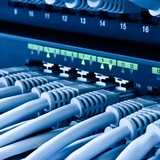
Telegram-канал learnnetworking - Learn Networking
 533
533
Learn Networking from Scratch.

 533
533
Learn Networking from Scratch.

Whenever I partially type a command I can use the ? to see my options.
Читать полностью…
If I want to return back to user mode I can do this.
Читать полностью…
If the switch does not have a configuration, you'll see the following:
—- System Configuration Dialog —-
Would you like to enter the initial configuration dialog? [yes/no]:

And finally you'll see an overview of the hardware that this switch offers.
Читать полностью…
And once it's done it will do a POST (Power On Self-Test):
Читать полностью…
Now IOS is loaded you will see something like this, you see this banner and the IOS version that I‟m running. This is a Cisco 3560 switch.
Читать полностью…
This is what it looks like on a real switch: Above you see that it‟s checking the flash drive of the switch. Next step is to load the IOS image that it found on the flash drive.
Читать полностью…
Make sure you select serial and type in the correct COM port number.
If you don't know the COM port number you can look it up in the windows device manager.
You need to leave speed at 9600. Click on open and you will have access to your switch.

The last thing you require is an application to connect to your serial port.
Putty is a good free application to start with, you can download it here:
http://www.chiark.greenend.org.uk/~sgtatham/putty/download.html

Secondly we'll need one of those Cisco console cables or we can't connect our computer to the switch.
Читать полностью…
Cisco also offers a GUI (Graphical User Interface):
- CNA (Cisco Network Assistant) for switches.
- SDM (Security and Device Manager) or CCP (Cisco Configuration Professional) for routers.
SDM was the first version of the GUI but now it has been replaced by CCP.
The advantage of a GUI is that it has wizards that let you configure complex things with a few clicks.
The downside however is that:
A) you might have no idea what you are doing.
B) when you need to troubleshoot you'll need the CLI 9 out of 10 times. I'm not a big fan of the GUI but it's best to see for yourself.

I typed in “cl?” and the CLI tells me that there are two commands that start with the letters “cl”. There's the
“clear” command and the “clock” command.

Let's start with a simple example. We'll configure the clock on our switch so I can demonstrate how the CLI works:
Читать полностью…
That's it! We are now in privileged mode where we have full access to our device. You can recognize it because of the # symbol.
Читать полностью…
You can recognize it because of the > symbol. When you are in user mode you don't have full access to the device. What we want is privileged mode which is also known as enable mode.
Читать полностью…
If you type yes and press enter it will walk you through a wizard where you can configure some basic settings.
I'm going to skip it since we'll configure everything ourselves.

Once the switch is done you finally get to see this message:
Press RETURN to get started!

Once the POST is done we'll get a final warning:
Читать полностью…
IOS images are stored on the flash drive in a compress format, it will be uncompressed and copied to the RAM of the switch.
Читать полностью…
As soon as you power on the switch this is what it will do:
1. Check the hardware.
2. Locate the Cisco IOS image.
3. Locate and apply configuration (if available).

If you don't have a COM / serial port on your computer or laptop, use your USB to serial cable.
Читать полностью…
First of all we need to have a switch. I have a Cisco Catalyst 3560 that I'll use for my
demonstration.

We will start with the basic configuration of a cisco device.
First I will use a switch to demonstrate the CLI but the same commands work on a router.
Secondly I will demonstrate CCP on a router.

Cisco IOS:
Just like a computer a switch or router requires an operating system to support the hardware.
Cisco IOS is the operating system that you will find on the switches and routers and some other devices like wireless access points.
When you work with Cisco routers and switches you will do most of the configuration using the CLI (Command Line Interface).
For some of you this might prove challenging in the beginning and it will take some time to become familiar with the CLI, however once you get used to it I promise that it‟s the fastest and most convenient method to configure routers or switches.
The CLI can be accesses by using the blue Cisco console cable (it‟s called a rollover cable) or remotely using telnet or SSH.